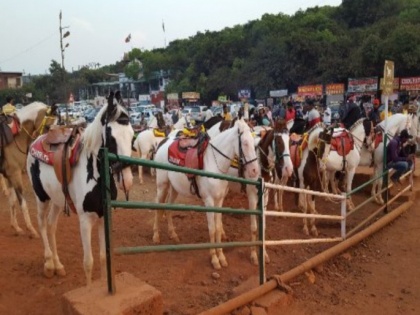Going to Mahabaleshwar? Don't ride those horses. Read Why
By Lokmat English Desk | Updated: January 5, 2024 18:35 IST2024-01-05T18:35:20+5:302024-01-05T18:35:47+5:30
A recent study conducted by the Gokhale Institute of Politics and Economics' Center for Sustainable Development (CSD) has shed ...

Going to Mahabaleshwar? Don't ride those horses. Read Why
A recent study conducted by the Gokhale Institute of Politics and Economics' Center for Sustainable Development (CSD) has shed light on the spread of diseases in Mahabaleshwar due to horse waste. The study, led by Dr. Preeti Mastakar, was presented at a press conference attended by Professor Gurudas Noolkar, Nikhil Atak, and others.
The CSD's "Health Risk Assessment and Modification Project" focused on Mahabaleshwar for three years, aiming to address various health concerns faced by local residents and tourists. Dr. Mastakar, along with her team, including Nikhil Atak, Disha Savant, Rohini Satpute, Suraj Bhole, and Vinit Dupare, worked on the project, leading to significant findings.
The study identified the presence of contaminants in the Venana Lake, leading to various diseases among citizens and tourists. Even after vaccination, children were found to be affected by the Rotavirus, which was traced back to the horse waste.
District Collector Jitendra Dudi and Mahabaleshwar Tehsildar Tejaswini Patil have been informed about the study, and they have expressed their commitment to take necessary actions.
Study Overview:
The study involved collecting water samples from the Venana Lake in Mahabaleshwar, which serves as a water source for horses and various purification centers. The analysis revealed pollution, prompting further investigation. The horse waste was identified as a source of contamination, leading to health issues in both horses and humans.
Health Risks:
The contamination of the Venana Lake has resulted in several health issues among citizens and tourists, including diarrhea, respiratory infections, typhoid, and other waterborne diseases. Additionally, children are susceptible to the Rotavirus, linked to the horse waste. Local doctors have reported an increase in respiratory infections, Rotavirus cases, and gastrointestinal disorders.
Polluted Lake:
The study confirmed that the waste from the 170 horses in Mahabaleshwar directly contributes to the pollution of the Venana Lake. The waste accumulates on the ground, gets airborne during horse movement, and ultimately enters human bodies through respiratory pathways. This has led to various health problems among the local population.
Recommendations:
To mitigate the issue, the study recommends:
- Keeping horses away from the lake and populated areas.
- Creating designated areas for horse waste disposal.
- Ensuring clean water sources for horses.
- Implementing a collective waste management system to convert horse waste into bio-gas.
The study emphasizes the need for urgent intervention to address the health hazards caused by horse waste in Mahabaleshwar. The findings have been shared with local authorities, and actions are expected to be taken soon.
Open in app